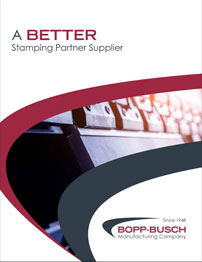
Behind every precisely stamped metal piece, carefully welded part, and delicately E-paint-coated product is a qualified stamping production team. Every worker plays an important role in ensuring that customer products are consciously designed, high-quality, properly delivered, and ready to assemble.
Interested in a career in the metal stamping industry? Here are a few of the roles, and their qualifications, that make this industry so critical and successful:
Tool and Die Maker
Tool and die makers are highly skilled employees that use engineering design plans to carefully cut and stamp pieces of metal into their desired forms. Due to the nature of manufacturing environments, tool and die makers deal with heavy machinery and must adhere to careful safety precautions to avoid injury. Typically, this role involves an apprenticeship that gives hands-on experience with the equipment and products being created.
Tool and Die Designer
Unlike tool and die makers, the designers typically work behind the scenes designing blueprints and plans that will later become reality as they’re manufactured. This role involves experience and knowledge of metal products and shapes that must be transferred from a computer to a manufacturing environment. This level of design knowledge usually requires experience with CAD and/or other software programs, though this can often be learned via apprenticeships or in trade school.
CNC Operator
CNC operators are responsible for the equipment and machinery running smoothly and efficiently. They will often handle adjustments and the operation of tools, requiring a working knowledge of the hardware and how to control it. This is often an entry-level role that can typically be learned through an apprenticeship or trade school where one can become familiarized with how machines function and how to adjust settings for different outcomes.
CNC Programmer
CNC programmers, much like tool and die designers, often work behind the scenes to ensure that equipment and machinery are properly programmed to perform their desired tasks. These programmers create the programs and instructions that allow operators and machinists to perform desired tasks. Many CNC programmers have a background in trade school or a certificate specializing in product and process technology.
These roles, and many others, ensure that manufacturing environments remain safe, machinery is functional and maintained, and customers are satisfied with their final products. Bopp Busch Manufacturing is always seeking qualified and hardworking individuals to join our production team – visit boppbusch.com to learn more!


